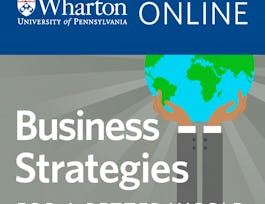When is it good business practice to invest for social good? What are the most innovative and effective business strategies for developing positive social impact around the world? Designed by renowned Wharton professors Katherine Klein and Chris Geczy to help individuals, organizations, and investors bring about societal change, this course introduces the fundamentals of impact investing, and developing a business strategy that drives social impact. You’ll learn how to become a leader who cultivates purpose and inspires change, measure societal impact through evidence-based models, and invest in ventures effectively and meaningfully. By the end of this course, you’ll have a deep understanding of the realities of leading an organization with purpose, and be able to build successful strategies that bring impactful change to the world.


Business Strategies for Social Impact
This course is part of Business Strategies for A Better World Specialization
Taught in English
Some content may not be translated


Instructors: Katherine Klein
13,215 already enrolled
Included with 
Course
(534 reviews)
94%
Details to know

Add to your LinkedIn profile
4 quizzes
Course
(534 reviews)
94%
See how employees at top companies are mastering in-demand skills

Build your subject-matter expertise
- Learn new concepts from industry experts
- Gain a foundational understanding of a subject or tool
- Develop job-relevant skills with hands-on projects
- Earn a shareable career certificate


Earn a career certificate
Add this credential to your LinkedIn profile, resume, or CV
Share it on social media and in your performance review

There are 4 modules in this course
In this module, you’ll learn how to define your purpose and develop a plan to cultivate purpose for your organization. You’ll gain a deep understanding of the critical importance of purpose-driven leadership in a successful organization and why businesses can and should pursue a larger social or environmental purpose. You'll also analyze the five models of social purpose, from generous contributors to impact investors. Through close examination of case studies such as Daily Table and TOMS shoes, you’ll learn how to test your assumptions and find the winning situation for your investors, employees, and customers. By the end of this module, you’ll have a more clearly defined understanding of the purpose your organization wants to pursue and how to prepare for successful implementation.
What's included
17 videos4 readings1 quiz
What is the relationship between impact and financial performance? Does it pay for a company to drive impact? In this module, you'll learn various methods businesses use to create social and environmental impact. You’ll identify the different components of impact measurement: valence, focus, depth, breadth, and cost-effectiveness. With Nick Ashburn, Senior Director of Impact Investing of Wharton Social Impact, you’ll discuss real-life examples such as Starbucks, Campbell’s Soup, and Warby Parker, and the impactful decisions they made in employment, operations, and investment. By the end of this module, you’ll be able to refine the method in which your business can reduce environmental challenges and/or ensure fair and equal opportunity, and create a plan for your company to drive both impact and financial performance.
What's included
11 videos1 reading1 quiz
In this module, you’ll examine the criteria and standards of evidence developed to measure the true social impact of your organization. You’ll identify the Sustainable Development Goals (SDGs) and Environmental Social and Governance Criteria (ESG) to be able to better answer the question “What is the Impact of X?” By examining the Nesta Foundation Framework and its standard of evidence, you’ll explore the different levels of rigor for each logic model using real-life examples and learn to accurately assess your organization’s inputs, outputs, and impact. By the end of this module, you’ll be able to calculate the Social Return on Investment (SROI) of your enterprise and be able to strategize an effective plan for your business.
What's included
10 videos1 reading1 quiz
This module was designed to introduce you to the basics of impact investing. By analyzing global trends on Socially Responsible Investing (SRI), classic models of impact investment such as microfinance, and actual research data, you’ll gain a deeper understanding of the current models of impact investment and which model would work best for your organization. Through exploring other benefit corporations and the UN Principles of Responsible Investment, you’ll discover how NGOs, government, and shareholders and their roles in impactful investments. By the end of this module, you’ll be able to gauge the risk and rewards behind impactful investments, and be able to navigate these issues effectively while exerting sustainable and meaningful impact.
What's included
8 videos2 readings1 quiz
Instructors

Offered by
Recommended if you're interested in Business Strategy

University of Pennsylvania

Coursera Project Network

University of Pennsylvania

University of Pennsylvania
Why people choose Coursera for their career




Learner reviews
Showing 3 of 534
534 reviews
- 5 stars
69.47%
- 4 stars
25.28%
- 3 stars
4.68%
- 2 stars
0.18%
- 1 star
0.37%
New to Business Strategy? Start here.

Open new doors with Coursera Plus
Unlimited access to 7,000+ world-class courses, hands-on projects, and job-ready certificate programs - all included in your subscription
Advance your career with an online degree
Earn a degree from world-class universities - 100% online
Join over 3,400 global companies that choose Coursera for Business
Upskill your employees to excel in the digital economy
Frequently asked questions
Access to lectures and assignments depends on your type of enrollment. If you take a course in audit mode, you will be able to see most course materials for free. To access graded assignments and to earn a Certificate, you will need to purchase the Certificate experience, during or after your audit. If you don't see the audit option:
The course may not offer an audit option. You can try a Free Trial instead, or apply for Financial Aid.
The course may offer 'Full Course, No Certificate' instead. This option lets you see all course materials, submit required assessments, and get a final grade. This also means that you will not be able to purchase a Certificate experience.
When you enroll in the course, you get access to all of the courses in the Specialization, and you earn a certificate when you complete the work. Your electronic Certificate will be added to your Accomplishments page - from there, you can print your Certificate or add it to your LinkedIn profile. If you only want to read and view the course content, you can audit the course for free.
If you subscribed, you get a 7-day free trial during which you can cancel at no penalty. After that, we don’t give refunds, but you can cancel your subscription at any time. See our full refund policy.

